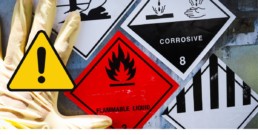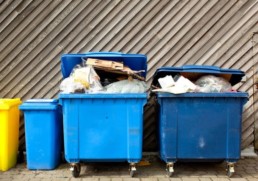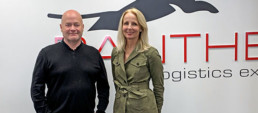The dangers of hazardous waste and how to do it safely
Introduction
Hazardous wastes are those which are dangerous and difficult to handle. If your business produces hazardous waste you have a duty of care to make sure it is disposed of properly.
Proper disposal of hazardous waste is crucial for the safety of people, animals, and the environment. Hazardous waste, if not handled correctly, can lead to severe health risks, contamination of soil and water, and dangerous chemical reactions. This document provides an in-depth understanding of the dangers associated with hazardous waste and offers guidelines on how to dispose of it safely.
The Dangers of Hazardous Waste
Hazardous waste encompasses many materials that pose significant risks due to their chemical composition, flammability, reactivity, or toxicity. Below are some of the primary dangers associated with hazardous waste:
Health Risks
- Exposure to Toxic Substances: Direct contact with hazardous waste can result in skin burns, respiratory problems, and poisoning. Many hazardous materials can be absorbed through the skin or inhaled, leading to serious health issues.
- Long-term Health Effects: Repeated exposure to certain hazardous materials, such as asbestos or heavy metals, can lead to chronic illnesses, including cancer, neurological disorders, and reproductive issues.
Environmental Impact
- Soil and Water Contamination: Hazardous waste can seep into the soil and groundwater, contaminating drinking water sources and agricultural land. This contamination can persist for years, affecting ecosystems and human health.
- Air Pollution: Improper disposal methods, such as incineration without appropriate controls, can release toxic fumes and particles into the air, contributing to air pollution and respiratory ailments.
Fire and Explosion Hazards
- Flammable Materials: Certain hazardous wastes, such as solvents and chemicals, are highly flammable and can easily ignite, causing fires and explosions that put lives and property at risk.
- Reactive Substances: Some hazardous materials can react violently with other substances, leading to dangerous situations that can result in explosions or release toxic gases.
How to Dispose of Hazardous Waste Safely
Safe disposal of hazardous waste requires adherence to specific regulations and best practices. Below are the key steps to ensure the safe handling and disposal of hazardous materials in commercial settings:
Identify Hazardous Waste
Properly identifying hazardous waste is the first step in ensuring its safe disposal. This involves:
- Labeling and Segregation: Label all hazardous materials and segregate them from non-hazardous waste. This helps prevent accidental mixing and ensures that each type of waste is handled appropriately.
- Understand hazardous materials, their properties, risks, and safe handling procedures.
- Further guidance for workplace health and safety can be found at The Health and Safety Executive (HSE).
Use of Appropriate Containers
The containers used for storing and transporting hazardous waste must be suitable for the specific type of waste, following all relevant regulations for proper storage and disposal. Key considerations include:
- Durability: Use durable containers that are resistant to the chemicals they will hold. This prevents leaks and spills.
- Sealing: Ensure containers are properly sealed and labelled to prevent the release of hazardous substances.
Compliance with Regulations
Adherence to regulations is essential for the safe disposal of hazardous waste:
- These regulations apply to those who produce, broker/deal, carry and receive hazardous waste to keep, treat or dispose of. Hazardous waste must be accompanied by correctly completed paperwork called a consignment note, or hazardous waste consignment note (HWCN). The note must be prepared before any hazardous waste is moved and is required for all movements of hazardous waste.
- Record-Keeping: Maintain accurate records of the types and quantities of hazardous waste generated, as well as the disposal methods used. These ensure the traceability of the waste from origin to disposal.
Training and Education
Educating employees about the dangers of hazardous waste and proper disposal methods is crucial for maintaining a safe work environment. Training programs should cover:
- Hazard Identification: Teach employees how to identify hazardous materials and understand their risks.
- Emergency Procedures: Train employees on emergency procedures in case of spills, leaks, or exposure to hazardous substances.
Working with Footprint Recycling
Working with a professional waste management company will ensure that hazardous waste is disposed of safely and in compliance with regulations. We have the expertise to handle hazardous waste safely and will ensure you have the right equipment for safely transporting, treating, and disposing of hazardous materials.
All businesses have a responsibility to dispose of hazardous waste safely. By understanding the dangers of hazardous waste and following best practices for its disposal, businesses can protect their employees, the public, and the environment. Proper identification, appropriate containers, regulatory compliance, professional waste management services, and employee training are all essential components of a comprehensive hazardous waste management strategy.
Call us on 01484 660770 or email our team if you'd like to find out more.
INTRODUCING THE NEW 2025 MANDATORY WASTE LEGISLATION IN ENGLAND
In October 2023, the UK Government introduced new Simpler Recycling legislation as part of the Environment Act 2021 to improve waste collection and recycling in England.
The new legislation aims to clarify what materials can be recycled, standardise recycling practices at home, work, and school, reduce landfill waste, tackle illegal waste disposal, and increase recycling rates.
As part of the Simpler Recycling legislation, delivery timelines have been set:
- 31 March 2025 - Non-households
Businesses (more than ten employees) need to separate dry recyclables and food waste. - 31 March 2026 - Households
Local authorities must collect all dry recyclable materials and separate weekly food waste collections (which can be combined with garden waste) - 31st March 2027 - Households and non-households
Inclusion of plastic film packaging and plastic bags in the plastic waste stream - 31st March 2027 - Micro-businesses
Businesses with fewer than ten employees must recycle all specified waste streams.
From the end of March 2025
Businesses with ten or more employees must separate dry recyclables into specific containers and arrange food collection separately.
What does this mean for your business?
All mixed recycling, including cardboard, plastics, glass, and metal, should be carefully separated and disposed of in accordance with the new guidelines to ensure that each material is recycled appropriately and to minimise environmental impact.
If a business produces more than 5kg of food waste per week, it must arrange a separate collection by licensed waste carriers. This includes biodegradable materials from processing or preparing food, such as inedible parts like bones, eggshells, fruit and vegetable skins, tea bags, and coffee grounds. The new legislation excludes micro-businesses (businesses with fewer than ten full-time equivalent employees).
According to the official government response, food waste collected must undergo anaerobic digestion treatment. This process generates biofuel, which can be used for energy, while digestate is a nutrient-rich substance produced by anaerobic digestion that can be used as a fertiliser, helping to form a circular economy.
To comply with the new legislation, your business must implement the new waste requirements, including storage and collection processes, by 31 March 2025. Businesses that fail to comply with the new regulations will face fines, enforcement actions, and potentially prosecution.
Compliance ensures that your business will avoid financial penalties, demonstrate corporate responsibility, and improve sustainability credentials. It’s also an opportunity to review your services and save costs.
How can Footprint Recycling help?
- Footprint Recycling will conduct a thorough waste audit, evaluating your current processes, staff awareness, equipment, sustainability, waste streams, volumes, service frequency, bin types, and costs.
- We will ensure compliance with new regulations and identify the best solutions for your business. We will help establish suitable systems to maintain compliance and prevent business disruptions.
- Our team will provide training to ensure employees understand the importance of new practices and know how to separate food waste correctly.
- We will provide food waste collection services and arrange appropriate collection schedules.
- We can assist you in achieving significant cost savings by reducing general waste volume and the associated costs of waste removal and recycling.
- We will generate reports that showcase your sustainability efforts, demonstrating your dedication to reducing environmental impact.
- We will support your efforts to comply with regulations, enhance your company’s brand reputation, particularly among environmentally conscious consumers and investors, and explore partnerships with local charities to donate surplus food.
By embracing these innovations, businesses can comply with regulations and turn food waste management into a competitive advantage.
Get in touch to discuss your requirements.
PANTHER PARTNERS WITH FOOTPRINT RECYCLING TO TAKE SUSTAINABILITY PLEDGE TO THE NEXT LEVEL
Leading two-person white glove delivery specialist Panther Group has joined forces with total waste management firm Footprint Recycling to help them reduce their carbon footprint, taking them a step closer to achieving their Net Zero pledge.
In recent years, as a part of its ESG pledge, Panther has vastly increased its commitment to improving its environmental impact by keeping its waste unpolluted and to a minimum by following best practices. They have increased recycling measures, conserved energy more efficiently, and used environmentally friendly technologies.
To take its commitment one step further, the business has even set a target to implement a zero-waste culture throughout every aspect of its operations.
Having provided a comprehensive range of sustainable waste and recycling solutions to a wide range of sectors since 2008, Footprint Recycling is passionate about helping businesses manage their waste, reduce their carbon footprints and achieve their sustainability goals.
Since partnering with recycling specialist Footprint, Panther has greatly improved their recycling and environmental credentials. To date this year alone, Panther has recycled more than 453 tonnes of cardboard, plastic, and expanded polystyrene, 226 tonnes of general waste, 144 tonnes of TVs, and over 50,000 old mattresses collected and recycled on behalf of its customers and 25,000 tonnes of metal from washing machine bodies also recycled. The company’s carbon footprint by installing energy-efficient LED lighting throughout the depots has also improved by 60%.
And ever mindful of the need to provide a ‘green’ ethical service, Panther provides a furniture recycling service and closely adheres to the WEEE Directive.
Panther can now boast that 80 percent of its waste is recycled – with an aim to increase that figure to 90 percent over the next 12 months.
As part of its long-term sustainable energy programme the company is collaborating with Ev3power and is considering solar, wind turbine, and hydrogen options to power its operations and are also considering electric and hydrogen options for its fleet.
In recent weeks Panther has conducted a number of electric vehicle trials and now boasts a forklift fleet that is 60 percent electric.
Guy Burgess, Logistics Director commented: “With combatting climate change currently at the forefront of the global agenda, we have chosen to partner with Footprint Recycling to further improve our environmental impact and make a positive difference to our ecosystem.
“As a business, we are already making huge strides in making long-term and sustainable changes by pushing sustainability in every aspect of the business. Ingraining environmental consciousness within the company’s culture and Footprint Recycling will be a fundamental driver in helping us to facilitate this.
“No longer is it acceptable for companies to provide a 'sustainability statement' as consumers are far savvier and more discerning about how they spend their money and what businesses they’re willing to support and trade with.
“More than that though it’s vital that as a growing business we respond to the current climate crisis and act accordingly. The government has set a pledge for the UK to achieve Net Zero status by 2050, and as a company that strives for sustainability, we want to join the fight against global warming by driving down our environmental impact over the coming years.”
Robyn Brook, Founder & Chief Executive Officer, Footprint Recycling commented: “Our business is built on a foundation of helping our customers embrace the circular economy and improve their sustainability with a focus on achieving zero waste to landfill through recycling and reducing emissions.
“With pressure on businesses, like Panther, to do more to minimise their environmental impacts, our aim is not only to manage waste but to challenge the industry norms by developing processes bespoke to each client and introducing new ways to reduce, reuse and recycle.
“We’ve been working with Panther for several years, over which we have developed a fantastic relationship that allows us to continually strive and look at new ways to help them improve their environmental credentials and assist with their sustainability journey.”
The beginning of a new era for Footprint Recycling
It's the beginning of a new era for Footprint Waste Management as we launch our new brand identity, company positioning, and, soon, a new website.
Our new brand represents our continued commitment and investment in our company. We have seen significant growth over the past few years, a growing team and new major contract wins. We've also expanded our service offering, which now includes Carbon Neutral, complementing our existing offering of complete waste management and recycling.
As we develop and expand, everything we do still revolves around our experiences and customers. The new brand represents our simple company ethos of providing services to promote a circular economy - Waste Management - Recycling - Carbon Neutral.
Robyn Brook, Director, said: "Our business has gone from strength to strength but we couldn’t have done it without our fantastic customers and staff. I thank you all for believing in us and I thank our wonderful team who make every day possible. Clare and I are inspired (and regularly saved!) by you all.
"Our waste management vision is simple, to be the best and never give up. We started Footprint because we believed we could do better, be faster, more creative, find a better solution, make our clients more money, save them money, be useful, be supportive, be honest, think outside the box, add value to their business by understanding their business, offer the best waste solution and results for sustainability, find the ‘how can’.
"We review, we learn, we set targets, we train, we drive, we track, we deliver results then we review and re-set the goal posts.
"We want to grow our business and our network and we want to learn more. We have many customers who we’ve helped to reach 97%-98% recyclability with as much of that as possible going to re-use.
The new brand represents where we stand as a company today; it's a simple formula, but we feel it's the perfect fit for us, it unifies our services, and it was necessary to reflect and establish ourselves now and in the future."
If you'd like to chat to us about your current waste management, recycling, or reducing your carbon emissions, give us a call on 01484 660770 or drop us an email, and we will give you a call.




